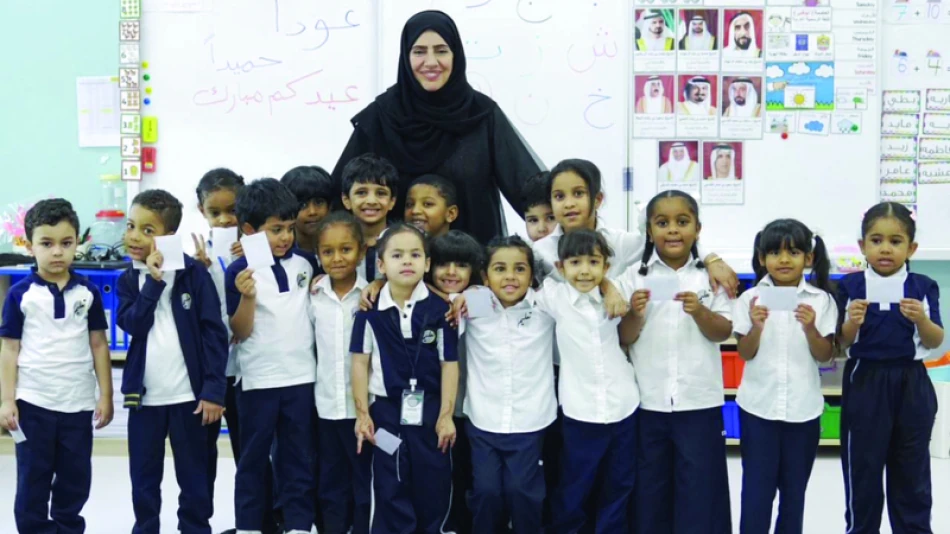
Preparing Students Mentally and Academically: Ministry of Education's New Plan
UAE Schools Launch Bold Educational Overhaul as One Million Students Return
The United Arab Emirates has embarked on its most ambitious educational reform in years, welcoming over one million students back to classrooms with sweeping changes that include artificial intelligence curricula for kindergarteners and the elimination of traditional testing methods. The reforms signal the Gulf nation's determination to build a skills-based economy while positioning itself as a regional leader in educational innovation.
Revolutionary Changes Reshape UAE's Academic Landscape
The Ministry of Education has introduced five major reforms that fundamentally alter how students learn and are assessed. Most notably, the ministry has abolished centralized examinations for the second semester across all educational levels, replacing them with school-based assessments that give teachers greater flexibility in evaluation methods.
This shift represents a significant departure from the test-heavy systems common across the Middle East and aligns the UAE more closely with progressive educational models seen in Finland and Singapore, where continuous assessment has proven more effective than high-stakes testing.
AI Education Starts in Kindergarten
Perhaps most striking is the introduction of artificial intelligence as a mandatory subject for students from kindergarten through grade 12. Unlike traditional subjects, AI education focuses entirely on practical projects rather than examinations, emphasizing ethical and responsible use of technology.
This move places the UAE ahead of most developed nations in integrating AI education at the primary level. While countries like South Korea and Estonia have introduced coding curricula, few have committed to comprehensive AI literacy from such an early age.
Streamlined Academic Pathways
The ministry has simplified student pathways from multiple tracks to just two: "General" and "Advanced." This consolidation comes with reduced content in mathematics and physics for grades 9-12 in the general track, acknowledging that not all students need intensive STEM preparation.
The new grading system distributes weight more evenly across three semesters: 40% for the first semester (30% ministerial exams, 10% teacher assessment), 20% for the second semester (teacher assessment only), and 40% for the third semester (30% ministerial exams, 10% teacher assessment).
Infrastructure Investment Signals Long-term Commitment
The government's commitment extends beyond curriculum changes. Nine new schools opening this year will accommodate 25,000 additional students, while maintenance work has been completed on 460 existing schools. The ministry has also distributed 47,000 laptops and printed over 10 million textbooks, demonstrating substantial financial backing for the reforms.
A fleet of 5,500 school buses ensures transportation infrastructure matches educational ambitions, while the recruitment of over 800 new teachers suggests the government recognizes that successful reform requires adequate human resources.
Teacher Evaluation Revolution
The fifth major reform targets educators themselves through a comprehensive competency assessment program covering 23,000 educational staff. This initiative, affecting 12,000 early childhood and elementary educators and 11,000 secondary school staff, aims to establish clear professional development pathways.
Such systematic teacher evaluation mirrors successful models in jurisdictions like Ontario, Canada, and Victoria, Australia, where regular competency assessments have improved educational outcomes significantly.
Economic and Strategic Implications
These reforms align with the UAE's Vision 2071 goal of becoming the world's best country by its centennial. By emphasizing skills over rote learning and integrating cutting-edge technology from kindergarten, the UAE is positioning its future workforce for a knowledge-based economy.
The timing is strategic, as regional competitors like Saudi Arabia and Qatar are also investing heavily in educational reform. However, the UAE's early adoption of AI education and reduced emphasis on standardized testing may provide a competitive advantage in attracting international talent and investment.
Gradual Implementation Reduces Disruption
The ministry has adopted a phased approach to the new school year, with flexible schedules during the first week to ensure smooth transitions. Students in grades 5-12 will attend shortened days on Monday and Tuesday, full days Wednesday and Thursday, and half-days on Friday during the initial period.
This gradual rollout demonstrates awareness that major educational reforms can create chaos if implemented too rapidly. The approach contrasts with more disruptive reform attempts in other countries and suggests the UAE has learned from international experiences.
With 295,000 students in government schools and hundreds of thousands more in private institutions, the success of these reforms will likely influence educational policy across the Gulf region and beyond. The UAE's willingness to eliminate traditional testing while embracing AI education represents a bold bet on the future of learning.
Most Viewed News

 Sara Khaled
Sara Khaled






